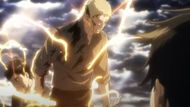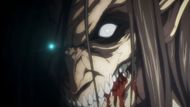When Attack on Titan first aired, it fooled all its viewers by making viewers feel like the Titans were the biggest threat to humanity. But the creator, Isayama, used this huge threat as the first misdirection. Attack on Titan was never really about Titans.
It was about freedom, cycles of trauma, violence, propaganda, and revenge. Additionally, it was about what it means to be human, to have agency, and ultimately, to challenge the fate you were handed. And in classic Hajime Isayama fashion, the first twist was hiding in plain sight all along.
The series opens with Wall Maria being breached by the Colossal Titan. People die. Eren’s mother is brutally eaten. He vows revenge on all Titans. This sets the stage for what seems like a classic “humans vs monsters” story.

But after looking closer into the world of Titans in Attack on Titan Season 2, we start to see cracks in this narrative. Titans aren’t mindless monsters. Some of them used to be human. Some still are human. For instance, Reiner and Bertholdt’s shocking reveal as the Armored and Colossal Titans wasn’t just a plot twist, but rather it was a full dismantling of the show’s original premise.
Suddenly, the Titans weren’t the enemy. They were weapons. Puppets in a centuries-old political war. From that point on, the story shifts, and that was always Isayama’s plan. The show lured us in with horror. Titans were grotesque, uncanny, and horrifying in their movements and expressions.
The Titans are no longer the threat—they’re the product of systemic abuse, racism, and generations of inherited pain. By Attack on Titan Season 4, the war is no longer about fighting Titans. It’s about Marley and Paradis. It's about who controls the story. And that was the actual enemy all along: the narrative.
The slow burn of a perfect plot twist

If we ask the question, how did Isayama pull this off so well? The answer lies in his masterful use of the art of distraction. Every major twist in Attack on Titan was carefully nestled inside moments of chaos, so your brain never had the time to ask the right questions.
Think back to Reiner and Bertholdt’s casual reveal. Mid-conversation, no dramatic music, no buildup. The scene plays out like a side conversation, when out of the blue, they reveal their truth. And just like that, the truth hits like a freight train. And then the silence. That silence is deafening.
Same with Eren’s manipulation of Grisha. Leading up to the reveal, the focus is all on Zeke. His beliefs, his view of their father, his trauma. The show builds Zeke up as the protagonist of this episode. Viewers think you’re watching his backstory. But they were not; rather, they were watching the beginning of the end for everyone.
Eren: The antihero who became god-like in Attack on Titan

Eren in Attack on Titan was never the typical shonen hero. He was angry, impatient, and constantly battling feelings of powerlessness. But that’s also what made him compelling. He wanted freedom—not just for himself, but for everyone. And he would burn the entire world to get it.
His transformation from a boy who wanted to kill all Titans to a man who becomes the most dangerous Titan user of all time is the real journey of the show. By the time we reach Season 4, Eren is no longer the protagonist. He’s the antagonist, the threat to be stopped.
Isayama’s commentary on war, propaganda, and cycles of hatred

The Titans are metaphors, sometimes for nuclear weapons, sometimes for inherited trauma, sometimes for racial cleansing. The Eldians are persecuted both inside and outside of the walls. Marley weaponizes Eldian children. Paradis uses nationalism to rally its people. Lies beget more lies. History is rewritten. Victims become oppressors.
It’s all horrifyingly familiar. Eren sees all of this. And instead of trying to break the cycle peacefully, he tries to end it with finality—with genocide. It’s a horrific answer, and that’s exactly what Isayama wants us to grapple with.
Final thoughts
In the end, Hajime Isayama didn’t just write a story about monsters. He wrote a story about humans and their ideologies. Ultimately, Attack on Titan was never about Titans. It was about a boy trying to break free from the chains of history. And in doing so, he bound the world in new chains of his own.
